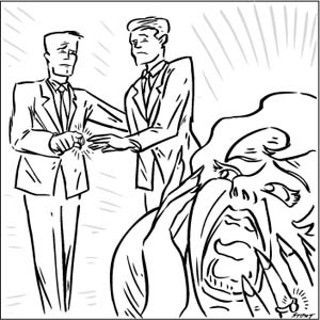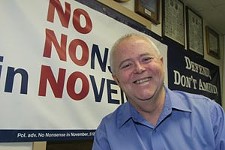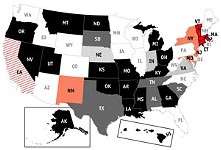Letters at 3AM
Questions of marriage
By Michael Ventura, Fri., Nov. 28, 2003

Say you're married, and, somewhere, two people whom you don't even know are also married -- how does that threaten your marriage? If you have kids, how do those two unknown people threaten the possible future marriages of your kids? How are you being harmed by the actions of these other two unknown people who are, after all, only doing what you're doing and only wish to enjoy what you claim to enjoy? Say you're a heterosexual married couple and, five minutes ago, somewhere, two gay people got married -- how, exactly, does that undermine your marriage?
Does it make you any less married? Does it make your feelings and beliefs any less real? Is the sanctity of your marriage so fragile that it's injured by the marriage of strangers? Do you, because a gay couple might be getting married somewhere in your country, suddenly have reason to question the fidelity of your spouse or your capacity to be a mother or a father? And if you believe your God is angry at those strangers, surely your God can take care of himself -- surely, if he happens to feel like it, and without help from politicians and lobbyists, God can handle a couple of queers exchanging rings. It's a simple question: How do those strangers, whom you wouldn't even know about if the media didn't blare the news, hurt your marriage?
I'd write a check to any Democratic presidential candidate who asked such questions when interviewed about the Massachusetts Supreme Court's recent decision to legalize gay marriage in that state. (Or maybe I should write a check to the Republican Party, since three of the four judges in the majority were appointed by Republicans.) But no Democrat has had the nerve to say, "Who marries whom -- what business is that of mine or yours? And how can it be the government's business to decide who should not get married? All the Massachusetts Supreme Court did, really, was to end a rule which said, in effect, 'These people may marry, these people may not' -- because government has no right to prevent people from marrying, does it? Well, does it?"
In 1996 Congress passed, and President Clinton signed, the Defense of Marriage Act, whereby the awesome power of the USA defined marriage as a relationship between a man and a woman. History will mark that as the moment the traditional ideal of marriage dropped dead. What people are arguing about now is the corpse's state of decomposition. When it takes an act of Congress to define marriage as heterosexual, it means that what seemed obvious to everyone for thousands of years is no longer obvious to anyone. The Defense of Marriage Act did the opposite of what it intended: It proved that the relationship of "gender" to "marriage" could no longer be taken for granted, but had to be spelled out on paper and signed into law. It openly admitted that, as the title of the act stated, traditional marriage needs defending, presumably because it is under attack.
The institution of marriage is under attack, but that's got nothing to do with whom you rub your private parts against and what orifices you favor. As gays, too, will discover once the novelty of legalized marriage wears off, the institution is under attack by the very technological progress America has fostered with such boastful pride.
Until roughly the first third of the American 20th century, marriage and an extended blood family were essential for the individual survival of all but the most adventurous -- because, very simply, basic survival took so much work. Clothes to be sewn and darned. Loaves of bread to be baked from scratch. Washing that took at least a day, often two. Small businesses and farms required a whole family to manage. Chores, chores, chores, without which the basics of life would be lacking. Illness, old age, and death, were tended at home. No Social Security, no Medicare, no nursing homes, minimal hospital care -- the family took care of you or no one took care of you. Women, especially, were lost without marriage; or, if they were to be "old maids," were lost without their extended birth family -- in other words, were lost without the strength of their parents' marriage. Marriage defined the possibilities of private and communal life ... for a world that no longer exists.
The situation of women is the best gauge of how completely that world has ceased to exist. Until a century ago, virtually no jobs outside the family were open to women -- and, with all the crucial chores necessary to run a household, women had no time for other work. Women were not thought worthy to vote until less than a century ago. Until the second World War, women and men rarely mixed in the workplace -- didn't mix much of anywhere (respectably) except in sanctioned family and community gatherings. Until about 30 years ago, few professions welcomed women (teaching, nursing, and acting were the prime exceptions). A traditional family, a traditional marriage, was the container and boundary of a woman's life.
The container didn't break from within. Technology, and the economic and social conditions it created, smashed the container from without by creating a society in which a human being can survive quite well without marriage -- and created conveniences that allow most family members an amount of "free time" unheard of in any other era. The chores of old, so necessary for daily life in their day, are all but forgotten. Marriage isn't even socially necessary for procreation. To be a "bastard" was once a gruesome, socially crippling, shameful stigma; now, many have children outside of marriage and no one thinks less of the children for it. The traditional marriage was a form, and nothing more, that evolved to meet needs that no longer exist. The needs determined the form; the form did not determine the needs. The social realities in which marriage evolved determined the container that marriage was.
The divorce rate didn't start wildly escalating until the 1960s -- but not because of social movements like women's liberation. The new social movements were responding to wildly evolving technological and economic realities. Which is to say, the social movements came about because they could -- because technology and commerce created an intoxicating liberty from the old necessities. Freed from those family necessities technologically, what was one to do with that freedom? The women's movement attacked that question with a vengeance -- now that the chores were no longer necessary, what were women for, what forms could they create that would give their lives meaning? That wasn't the rhetoric, but that was the situation. Technology created more social space, so to speak; a space that was far more expansive than traditional marriage could manage; a space that has yet to be defined, since it is still evolving, ever more wildly, goaded on by ever more drastic technological innovations. The instability of marriage today is what happens to a confined form when it's asked to cope with a drastically transforming unconfined social space.
No one who sponsored the Defense of Marriage Act, no one in a fury over the Massachusetts Supreme Court's decision, and no one advocating a constitutional amendment to ban gay marriage also wants a return to the technological limitations of, say, 1900. On the contrary, the same factions that want to "defend" (read: restrict) marriage also want unfettered markets for technologies and commerce. Yet everywhere modern technological capitalism has taken root, the traditional family has been severely undermined. That's the common factor -- not gay or even women's liberation.
A world awash in fundamentalisms of all kinds is a world in panic at technology's shattering of old forms. But you can't get the old forms back. They cannot be defended from the very technologies that you, at the same time, desire and invent and use and expand. On that scale, gay people getting married don't matter one way or the other. They are but one expression of a search for new forms. Stopping them won't stop the social space from expanding, and certainly won't make anyone's marriage more secure.
Once, we were defined by the physical necessities we had to manage. Those necessities are gone, and we must define ourselves. Define ourselves, not one another, for, as James Baldwin wrote, "It is simply not possible for one person to define another. Those who try soon find themselves trapped in their own definitions." The protests against gay marriage are the cries of people trapped in their own definitions by their fearful compulsion to define others. By defining and restricting others, they hope to confine themselves, to keep themselves from becoming lost in an ever rapidly expanding, undefined, frighteningly open-ended social space. But we are all "space travelers" now. And nothing is certain but that we can't go back. ![]()










